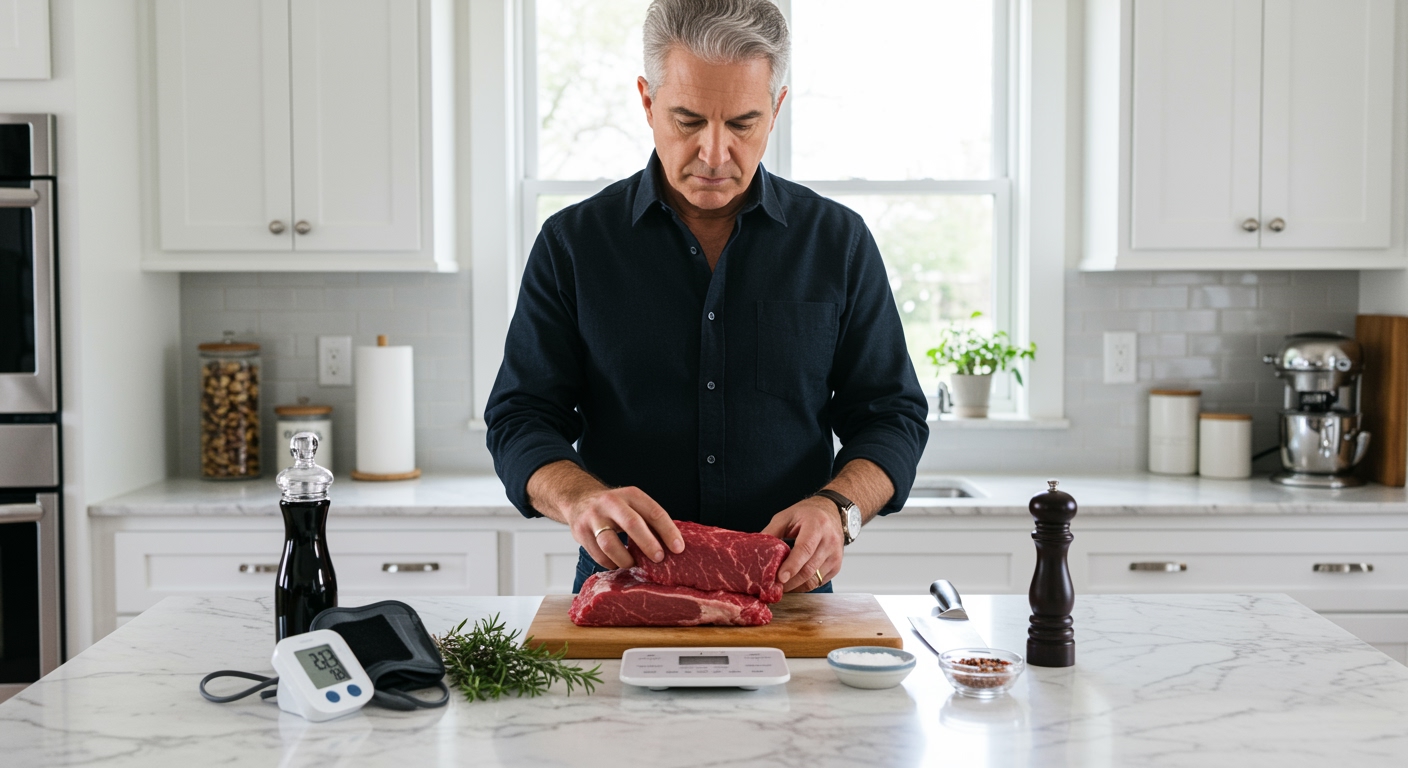✪ Key Takeaway: Lean beef can be safe for hypertensive patients when consumed in 3-4 ounce portions, prepared without added salt.
Introduction
Your doctor just told you to watch your blood pressure, and now you are staring at that juicy steak wondering if your red meat days are over.
You might be asking this question because conflicting information about red meat and hypertension has left you confused about what you can safely eat.
Hi, I am Abdur, your nutrition coach and today I am going to explain exactly how lean beef affects your blood pressure and when it becomes a problem.
What Makes Lean Beef Different From Regular Beef?
Lean beef contains less than 10 grams of total fat per 100 grams, with no more than 4.5 grams of saturated fat.
Regular beef cuts can contain up to 25 grams of fat per 100 grams, which significantly impacts your cardiovascular system.
The saturated fat content in regular beef triggers inflammatory responses in your blood vessels, leading to increased arterial stiffness.
Lean cuts like eye of round, top round, and sirloin tip provide high-quality protein without excessive saturated fat burden.
Your body processes lean beef differently because it does not overwhelm your digestive system with excess fats that require extensive bile acid production.
✪ Fact: Lean beef contains all nine essential amino acids your body cannot produce on its own.
How Does Lean Beef Actually Affect Blood Pressure?
Research shows that moderate consumption of lean beef does not significantly raise blood pressure in healthy individuals.
The key lies in the sodium content and preparation methods rather than the beef itself.
Fresh lean beef naturally contains only about 60 milligrams of sodium per 100 grams, which is relatively low.
Problems arise when you add salt during cooking or choose processed beef products that contain added preservatives.
Your kidneys regulate blood pressure by controlling sodium and water balance, so excessive sodium intake forces them to work harder.
The protein content in lean beef can actually support healthy blood pressure by providing amino acids that help maintain proper vascular function.
✪ Pro Tip: Cook lean beef with herbs and spices instead of salt to enhance flavor without raising sodium levels.
What Portion Size Is Safe For Hypertensive Patients?
A safe portion of lean beef for hypertensive patients is 3 to 4 ounces, about the size of your palm.
This portion provides approximately 25 grams of protein without overloading your system with excess calories or saturated fat.
Consuming larger portions increases your total caloric intake, which can lead to weight gain and additional pressure on your cardiovascular system.
Your body can efficiently process this amount of protein without triggering significant increases in blood urea nitrogen, which can affect kidney function.
Eating lean beef 2 to 3 times per week within these portion limits allows you to enjoy the nutritional benefits without health risks.
The timing of consumption also matters because eating large protein portions late in the evening can affect your sleep quality and morning blood pressure readings.
✪ Note: Use a kitchen scale initially to train your eye for proper portion sizes.
Which Cooking Methods Are Best For Blood Pressure?
Grilling, broiling, and baking are the safest cooking methods because they allow excess fat to drain away from the meat.
Avoid frying or sautéing in oil because these methods add unnecessary calories and inflammatory compounds to your meal.
High-temperature cooking methods like grilling can create advanced glycation end products that contribute to vascular inflammation.
Marinating lean beef for at least 30 minutes before cooking helps reduce harmful compound formation and adds flavor without salt.
Slow cooking methods like braising allow you to use low-sodium broths and vegetables to create flavorful, heart-healthy meals.
Your cooking temperature should not exceed 400 degrees Fahrenheit to minimize the formation of heterocyclic amines that can damage blood vessels.
✪ Pro Tip: Add antioxidant-rich vegetables like bell peppers and onions to your beef dishes for extra cardiovascular protection.
When Should You Avoid Lean Beef Completely?
You should avoid lean beef if your blood pressure consistently reads above 180/110 mmHg despite medication and lifestyle changes.
Patients with chronic kidney disease may need to limit or eliminate beef consumption because their kidneys cannot efficiently process protein waste products.
If you experience digestive issues or bloating after eating beef, your body may be signaling that it cannot handle this protein source effectively.
Some people have genetic variations that make them more sensitive to heme iron found in red meat, leading to increased oxidative stress.
Your doctor may recommend avoiding beef if you are taking certain blood pressure medications that interact with tyramine or other compounds in red meat.
Listen to your body and monitor your blood pressure readings after consuming lean beef to identify any personal triggers or sensitivities.
✪ Note: Always consult your healthcare provider before making significant dietary changes while on blood pressure medication.
The Bottom Line
Lean beef can be part of a blood pressure-friendly diet when you choose the right cuts, control portions, and prepare it without added salt.
The difference between food being medicine or poison often lies in the dose and preparation method.
I would love to hear about your experiences with lean beef and blood pressure management, so please share your questions or thoughts in the comments below.
References
At NutritionCrown, we use quality and credible sources to ensure our content is accurate and trustworthy. Below are the sources referenced in creating this article:





